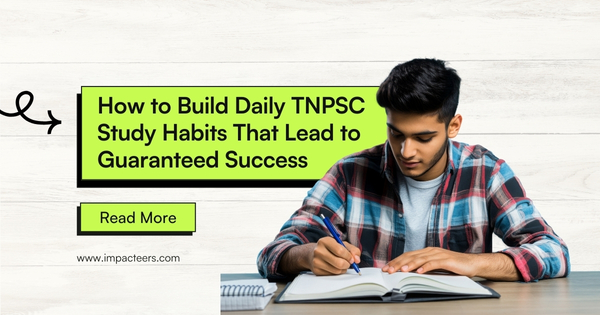Learn how to create a realistic government job study plan while working full-time. Tips for engineering graduates, latest vacancies, and exam prep with Impacteers courses.

Cracking government jobs in India is a dream for many. With the promise of job security, a decent salary, and long-term stability, it’s no surprise that thousands of graduates—whether in engineering, computer science, or arts—aspire to clear central and state-level exams each year.
But for those already working a full-time job, balancing work and preparation can feel impossible. Whether you’re in a 9-to-6 IT job, managing shifts in a private company, or teaching in a school, finding time to study for government exams like SSC, UPSC, TNPSC, RRB, or PSU recruitments in Tamil Nadu or other states can be a real challenge.
To explore more >>https://blog.impacteers.com/
The good news? With the right study plan, structure, and smart strategy, you can manage both.
This blog will guide you through building a realistic, effective government job study plan without quitting your job. We’ll also show how Impacteers Courses help working aspirants across India turn their dream of a govt job into reality.
Why It’s Possible (And Smart) to Prepare While Working
You don’t need to study 10 hours a day to crack a government vacancy exam. You need:
- Consistency
- Smart resources
- Time management
- Focus on high-yield topics
In fact, many toppers from engineering or graduate backgrounds were working professionals when they began their journey.
Step 1: Understand Your Exam and Timeline
Before creating a plan, you need to:
- Identify the exact government job you’re aiming for (e.g., SSC CGL, UPSC, TNPSC Group 2, ISRO, BEL)
- Check the syllabus, exam date, and latest vacancy updates
- Understand the eligibility (10th pass, 12th pass, graduate, engineering degree, etc.)
If you’re from Tamil Nadu, for example, you might focus on TNPSC exams, while someone from Delhi may prefer SSC or Central Govt jobs.
Use official sites like UPSC, SSC, and state commission websites to stay updated.
Step 2: Know the Syllabus and Prioritize Subjects
Every hour matters when you’re working. So, don’t try to study everything—focus on high-weightage topics.
For example:
| Exam | Key Subjects to Prioritize |
| SSC CGL | Quantitative Aptitude, Reasoning, English |
| UPSC Prelims | Polity, History, Economy, Current Affairs |
| TNPSC Group 2 | Tamil, General Science, Indian History, Aptitude |
| PSU (e.g., ISRO) | Core Engineering + GK + Reasoning |
Download the full syllabus and mark topics as:
- Strong
- Needs Revision
- Need to Learn
Step 3: Block Dedicated Time Each Day
If you’re attending TNPSC coaching or online classes, adjust these slots to include lecture time while keeping space for revision and mock practice. The most crucial step is building a daily study habit around your job. Use this proven format:
Sample Weekday Study Plan (for 9-to-6 workers)
| Time Slot | Activity |
| 6:00 AM – 7:00 AM | Revise yesterday’s notes, current affairs |
| 7:00 AM – 8:00 AM | Travel + listen to audio lectures or quiz apps |
| 8:00 PM – 9:30 PM | Study core subjects (Quant, GS, or Optional) |
| 9:30 PM – 10:00 PM | Mock tests or revision flashcards |
Weekend Plan
Use weekends for:
- Full-length mock exams
- Studying difficult topics
- Watching recorded lectures
- Analyzing errors and updating notes
Step 4: Use Smart Resources & Online Courses
Avoid spending hours searching for books. Instead, build a compact toolkit:
- Books: NCERTs (6–12), Lucent GK, R.S. Aggarwal, Laxmikant (Polity), Indian Economy by Ramesh Singh
- Apps: Testbook, AffairsCloud, BYJU’S for quizzes
- YouTube Channels: StudyIQ, Unacademy for daily news analysis
- Courses: Impacteers offers focused courses for working professionals with short video lectures, MCQs, and smart notes.
Why Choose Impacteers Courses for Government Job Prep
Impacteers is one of India’s most student-friendly career platforms, now trusted by thousands of working professionals aiming for central and state govt jobs.
What You Get:
- Courses tailored for graduates, engineers, and freshers
- Focused content for SSC, UPSC, TNPSC, RRB, and PSU roles
- Recorded sessions to watch anytime—perfect for working schedules
- Affordable, with free and paid options
- Free mentorship and career planning support
“I used Impacteers to prepare for TNPSC while working full-time in Chennai. Their short daily videos and smart notes made all the difference!” – Arun, Selected for TNPSC Group 2
Step 5: Take Weekly Mock Tests and Track Progress
Testing is critical.
- Take sectional tests on weekends
- Track accuracy and speed
- Maintain an error log (topics you consistently get wrong)
Mock tests simulate real exams and help reduce anxiety on exam day.
Step 6: Stay Consistent with a Monthly Goal Plan

Break your syllabus into monthly chunks. For example:
Month 1 Plan (For TNPSC or SSC)
- Polity: Chapters 1–5
- History: Ancient + Medieval
- Quant: Percentage, Ratio, Time & Work
- English: Synonyms, Grammar Rules
- 30 Editorials + 10 Current Affairs PDFs
Set daily targets and review weekly.
Step 7: Use Commute Time Wisely
Don’t underestimate your travel time.
Use it to:
- Listen to audio summaries
- Revise with flashcards
- Attempt quiz apps
- Read PDF notes on your mobile
Step 8: Avoid Burnout—Schedule Breaks
Working + studying is hard. Plan at least:
- One rest day every 10 days
- Daily 20–30 min of exercise or walk
- 7 hours of sleep
- Social time or hobby (15 mins a day)
Balance is key to long-term success.
Step 9: Join a Peer Group or Mentorship Program
Don’t prepare alone. Find:
- Telegram groups
- Study partners
- Local library groups
- Online forums
And if you need structured support, Impacteers offers mentorship sessions for job aspirants to:
- Plan better
- Stay motivated
- Get expert advice
Step 10: Stay Updated with Latest Government Job Vacancies
Many working aspirants miss opportunities because they aren’t aware of openings.
Follow:
- SSC, UPSC, TNPSC, RRB official sites
- Employment News Weekly
- Impacteers Telegram Channel for vacancy updates and results
Conclusion
Balancing a full-time job with government exam preparation is tough—but not impossible. The key is to study smart, stay consistent, and use resources that respect your time.
Whether you’re preparing for SSC, TNPSC, UPSC, or PSU jobs in India, building a structured daily and weekly plan is the starting point. With mentorship, focused courses, and test series from platforms like Impacteers, working professionals can finally take that leap toward their government job dream.
Remember: Consistency beats intensity. One focused hour every day can change your career forever.
FAQs
Q1. Can I crack a government exam with a full-time IT job?
Yes, many aspirants do it every year. You need a structured plan, the right study material, and discipline.
Q2. What’s the best job to target if I’m from a computer or engineering background?
PSUs (ISRO, BHEL), RRB JE, SSC JE, and Group A technical services are great for engineers and computer graduates.
Q3. How many hours should I study daily?
Even 3 hours daily is enough—if it’s focused. Weekends should be used for deep study and tests.
Q4. What if I can’t quit my job due to family needs?
You don’t need to. Smart study plans, online courses like Impacteers, and consistent revision can help you clear exams without quitting.
Q5. Which exam offers the highest salary among government jobs?
UPSC Civil Services, RBI Grade B, and Group A central services offer the highest salary and growth potential in the long run.



Post Comment